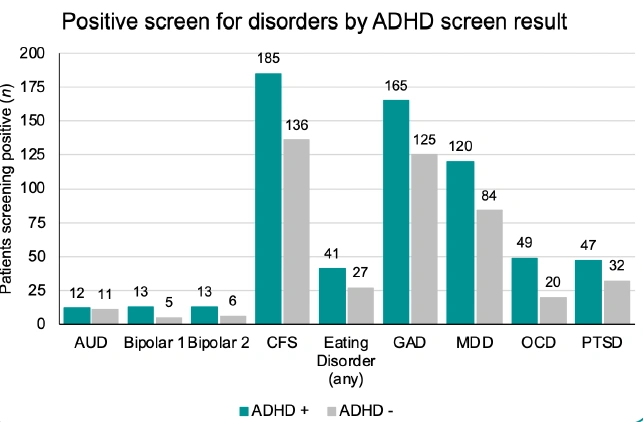Screening for ADHD Amongst Related Disorders

January 21, 2025
Attention-Deficit/Hyperactivity Disorder (ADHD) is often the focus of diagnostic evaluations, utilizing ADHD-specific screening tools such as those outlined by Pettersson et al. (2018). However, ADHD frequently co-occurs with other psychiatric conditions, necessitating a broader screening approach to optimize individualized care.
Understanding these associations is critical for clinicians working with patients suspected of having ADHD.
Co-occurrence of ADHD and related disorders
Research has consistently shown that ADHD is highly co-occurring with conditions such as depression, anxiety, bipolar disorder, eating disorders, and substance use disorders (Faraone et al., 2021). These overlapping symptoms can stem from:
- Untreated ADHD: ADHD symptoms may exacerbate or mask other psychiatric symptoms.
- Shared etiology: Common underlying biological or environmental factors may increase the risk of comorbid conditions (Solberg et al., 2018).
This complex interplay highlights the need for comprehensive screening strategies that evaluate multiple conditions simultaneously. Identifying co-occurring disorders enables clinicians to create comprehensive and effective treatment plans.
Study overview
A study conducted at the Rochester Center for Behavioral Medicine (RCBM) aimed to identify disorders most likely to co-occur with ADHD. Using MindMetrix, a diagnostic tool aligned with DSM-5 criteria, the research examined the likelihood of positive screenings for other disorders in patients suspected of having ADHD.
Methods:
- Comprehensive screening: Patients completed a broad psychiatric self-assessment via MindMetrix, which screens for over 60 mental health conditions.
- Disorder-specific screeners: Patients with likely diagnoses completed additional validated screeners for specific conditions, including bipolar disorder, generalized anxiety disorder (GAD), major depressive disorder (MDD), and others.
- Statistical analysis: Binomial logistic regression models analyzed the relationship between ADHD screening results and co-occurring conditions.
Key findings
Positive ADHD screenings were predictive of higher likelihoods for co-occurring disorders, particularly:
- Bipolar I Disorder
- Chronic Fatigue Syndrome (CFS)
- Eating Disorders
- Generalized Anxiety Disorder (GAD)
- Major Depressive Disorder (MDD)
- Obsessive-Compulsive Disorder (OCD)
- Post-Traumatic Stress Disorder (PTSD)
The strongest associations were observed with Chronic Fatigue Syndrome, OCD, and Bipolar I. These findings highlight the importance of broad diagnostic tools that screen beyond ADHD-specific symptoms.
Clinical implications
- Individualized treatment plans: Understanding co-occurring disorders helps clinicians develop personalized strategies that address the full spectrum of a patient’s mental health needs.
- Enhanced diagnostic accuracy: Comprehensive screening tools, such as MindMetrix, improve the detection of overlapping conditions, leading to more effective interventions.
- Holistic care: Considering the interplay between ADHD and other disorders ensures that treatment plans are well-rounded and address root causes rather than isolated symptoms.
Screening for ADHD in isolation may overlook critical co-occurring conditions that shape a patient’s mental health journey. This study reinforces the importance of comprehensive diagnostic tools like MindMetrix in evaluating multiple disorders concurrently.
By broadening the scope of screening, clinicians can develop more effective, individualized treatment plans, improving outcomes for patients navigating the complexities of ADHD and its related disorders.
References
- Pettersson R, Söderström S, Nilsson KW. Diagnosing ADHD in Adults: An Examination of the Discriminative Validity of Neuropsychological Tests and Diagnostic Assessment Instruments. J Atten Disord. 2018;22(11):1019-1031.
- Faraone SV, Banaschewski T, Coghill D, et al. The World Federation of ADHD International Consensus Statement: 208 Evidence-based Conclusions about the Disorder. Neurosci Biobehav Rev. 2021;128:789-818.
- Solberg BS, Halmøy A, Engeland A, Igland J, Haavik J, Klungsøyr K. Gender Differences in Psychiatric Comorbidity: A Population-Based Study of 40,000 Adults with Attention Deficit Hyperactivity Disorder. Acta Psychiatr Scand. 2018;137(3):176-186.
- For Providers | The MindMetrix Comprehensive Self-Assessment. Retrieved December 29, 2024, from https://mindmetrix.com
Ready to boost your practice?
Try 3 complimentary assessments on us.
